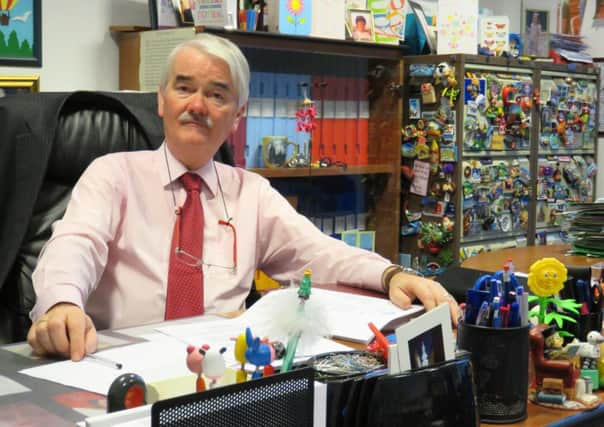Save these special young pupils from the educational scrap heap


Dr Cunningham has two priorities looking forward. Number one is that his school, which so devotedly serves the Craigavon Borough Council area and beyond, continues to receive the generous funding afforded by the soon-to-be-scrapped Southern Education Board.
The second is that the children who leave his school at 19 – “and are mostly assigned to the social and educational scrap heap” – are afforded the appropriate further training and funding to progress to the next stage of life.
Advertisement
Hide AdAdvertisement
Hide AdCeara is a very special school. It’s airy and spacious, colourfully and thoughtfully decorated. And no matter how profound the mental and physical handicap of the 136 pupils (ages 3-19) they are treated with equality. (Photographs of all 136 are prominent on the classroom walls).
The education of every child in Ceara – a truly integrated, cross-community school - is tailored to his or her needs.
They range from those deemed as PMLD (Profound Multiple Learning Difficulties) to those who could hold down a job in the outside world, if the training was available and the jobs more plentiful. The campaign continues for training from 19-25 to augment their years in schools like Ceara.
Peter Cunningham is a long-running thorn in the flesh of authority, waging a good fight to have the over-19s vacuum filled with meaningful further training and socialisation.
Advertisement
Hide AdAdvertisement
Hide AdHe points to the “post code lottery” of Northern Ireland. “In Maghera and Magherfelt, for example, politician Willie McCrea has helped drive a comprehensive over-19 training and education, and the same pertains in parts of Belfast and in Newry,” said Peter, “but not in this area.”
Post-school training is in the hands of the Department of Employment and Learning and the Department of Health and Social Services. And both are lacking in their policies and funding for the post-school sector of young people with learning difficulties.
Ceara pupils fall into three categories – the PMLD group already mentioned; those with mild disability; and the in-between sector. The PMLD children have severe learning disabilities, invariably accompanied by conditions like absence of speech, being wheel-chair bound, and sometimes blindness or deafness.
“No child is uneducable,” is the ethos, and each child has his or her education plan, guided by the 41 teachers and 40 classroom assistants. The staff-pupil ratio in some classrooms is approaching one-to-one, and full use is made of the latest in ICT and sensory equipment.
Advertisement
Hide AdAdvertisement
Hide AdBut at 19, the education stops short when they leave Ceara – “falling off the edge of a cliff” is how the staff equate it. The only development at 19 for PLMDs is a social education centre where scant funds are invested and where there are very few places. Most languish at home where 15 years of careful education are nullified.
At the other end of the spectrum are the children with slight learning difficulties – they can be taught to certain standards of reading, and relish the use of the iPads and modern technology that are such a help in modern education.
The Lurgan Mail called with such a class where one young man – we’ll call him William – spoke of his hopes of moving on to a job, perhaps packing shelves in a supermarket, something in the food sector, maybe in horticulture.
“But opportunities are few and far between,” said Peter Cunningham. “In these days of people being over-qualified, jobs in supermarkets, in the food sector and shop assistants are often going to people with university degrees. Sadly, the public generally hasn’t adapted terribly well to children with learning difficulties.
Advertisement
Hide AdAdvertisement
Hide Ad“Much of the over-19 projects are driven by voluntary groups, like the 180 Degrees Restaurant in Portadown. It’s terrific, but industry and the Government should be making the effort. And you wouldn’t believe the obstacles that health and safety place in our way when we try to send these pupils out for work experience with a permanent job in mind.”
But the biggest problem is the in-between group – those with relatively serious difficulties, “and for them there is nothing”. While the PMLD children can, in theory, find an occasional place in the social education centres, and the higher intelligent children a job, the in-between group invariably falls off that 19-plus cliff.
“It’s soul-destroying,” said Peter Cunningham. “Every member of staff in Ceara puts their heart and soul into developing and educating all the pupils to their full potential, and at the end, it all seems to be wasted – there is nothing for them.
“When the new education and health order takes over in April, I hope and pray they continue to fund the special schools at the current level and make post-school training a priority. I have been in special education for 35 years, and the over-19 policies are still much the same. That is not right.”